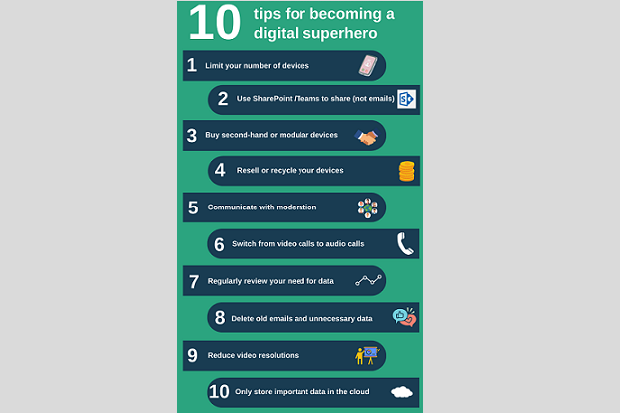
If you ever dreamed about helping Captain Planet save the world, Florian Paviot offers ideas for three easy steps that you can take to reduce your digital carbon emissions.
Our digital era is far from stagnating. Our internet use is increasing every year, with the development of social media, streaming services and growth of Internet of Things (IoT) technology, something that Adam Turner reflected on in his blog post in which he suggests ways to reduce social media and streaming consumption.
Likewise, our use of data is exponential and so are the resources needed to store this data. With that in mind, I would like to offer you three easy steps to reduce your digital carbon footprint and make Captain Planet proud.
1. Be mindful of the carbon impact of your devices
We are constantly exposed to adverts and buying the latest technology can be very tempting. Yet, production represents around 80% of your device’s (smartphone, tablet etc) embodied carbon, versus 14% for its usage. Also, buying second-hand, refurbished, or modular devices, greatly reduces the embodied carbon of that device.
Therefore, always reassess your need for a new device before taking the plunge and buying one. Ask yourself some key questions:
- Is your current device outdated?
- Is there a way to update it/repair it?
- Perhaps, instead of buying a laptop, a tablet, and a smartphone, could a single device do everything you need?
If you really do need to change your current device, consider reselling, donating, or recycling it. And Remember, Information and Communications Technology (ICT) devices are fragile and it’s wise to protect them (case, screen protector etc.), especially if you are the clumsy type.

This Photo by Unknown Author is licensed under CC BY-SA
2. Communicate with moderation
During our lives, we are reminded time and time again that communication is key to a successful career. Consequently, it can be tempting to over-share information with our colleagues. I stopped counting long ago the number of unnecessary emails I receive daily. These emails often contain attachments that greatly increase their carbon impact.
In his book ‘How bad are bananas?’ Mike Berners-Lee estimates the carbon emissions of an email to be between 0.3gCO2e and 26gCO2e, depending on the attachment and the device used to send it.
To be more specific, the estimation is based on the electricity required at each stage of the process (e.g., smartphones, network equipment, data centre etc) and the embodied carbon of the devices used to send and receive the email. Smartphones and tablets have lower embodied carbon than laptops and desktops.
This variation might not seem much for a single email, but it is substantial if we consider the number of emails sent in a year across Government organisations.
Hence my advice: communicate with moderation. Only send what’s necessary. This will not only benefit the planet, but also your colleagues’ headspace by not bombarding them with unnecessary emails. Besides, instead of sending email attachments to multiple recipients, why not share the file on SharePoint or MS Teams? This can provide a single source of information and avoid duplication of data.
Talking about Teams, did you know video calls consume much more energy than audio calls? Switching your camera off can reduce your environmental footprint in that meeting by 96%.This is due to the amount of data being transferred through the network between data centres and your device.
However, switching off video can have accessibility implications. If a video call is preferred, for example when someone is hard of hearing and they need to lipread, then lowering the video resolution can greatly reduce the carbon footprint. Likewise, watching streaming videos in standard quality resolution (SD), instead of full high-quality resolution (HD), can greatly lower your environmental impact.

3. Consider data management
In 2022, 97 zettabytes (1 zettabyte = 1 trillion gigabytes 😊) of data were created, captured, copied, and consumed worldwide. This represents 71 zettabytes more than in 2017 and we predict 181 zettabytes in 2025 (source: Statista.com).
Therefore, the path to becoming a digital hero must include proper data management methods. The development of SSD drive (Solid State Drive), a hard disk drive (HDD) on steroids, and cloud technology, offers tremendous storage capacities and it can be tempting to keep data in case we need it later.
Studies from 2010, 2011 and 2012 estimate the energy consumption to be between 2.5 and 7 kWh/GB for data transmission and storage. Which means a maximum of 0.00135 gCO2e/KB (based on 2022 conversion factor: 0.19338). These calculations are based on a range of equipment: Data Centres, undersea cables, IP core network, access networks, on site networking equipment and user device.
The carbon emission per kilobyte (KB) might seem very low but considering the amount of data created in a year, compressing, or deleting unnecessary data can make a big difference.
It also helps to consider what data needs to go in the cloud. Storing data in your HDD or SSD drive consumes less energy than storing your data in the cloud since it does not transmit the data through the network.
Many of us save a lot of pictures in the cloud, but we never really look at them. Perhaps it would be wiser to select our favourite ones first? And remember to tidy up your pictures folder regularly, so you can focus on your essential memories and reduce your carbon impact. Storing data in the cloud does make sense where you need to access it from several devices, or if you need to back it up.
Another good practice is to avoid data duplication as much as possible. This is especially true in a working environment where having several versions of the same file can create confusion. A single source of data would facilitate collaboration and limit carbon emissions.
So, what should we make of all this?
In conclusion, reducing your ICT carbon footprint is easier than you think! By making simple changes like buying modular or second-hand devices, communicating only what is necessary, and managing your data effectively, you can do your part to protect the environment. Now, go forth and be tech-savvy, eco-conscious hero!
Florian Paviot is a Data Analyst in Defra Digital data and technology services. Why not leave him a comment about what you think are the big challenges to becoming a digital superhero, along with any ideas you have for solutions to these challenges.
2 comments
Comment by George M Cook posted on
Yes Florian, we 100% agree.
We at Computers 4 Charity, from 25 years of experience, seem to have eventually evolved what we feel is the optimum ESG approach for ITAD.
Normal "refurbishing" delivers an estimated 2 year working life extension and "remanufacturing" delivers a 5 year life extension, but involves higher CO2 emissions in the process.
We have found that "rebuilding" is the optimum.
We don’t just datawipe … we rebuild, upgrading older devices where practical to use modern software and supply for re-use over ½ that we receive to charities and schools, recycle as few as possible and waste none. We dismantle, extreme clean (dust is an insulator making components run hotter and slower, as well as breaking down more quickly), repair, rebuild (renewing all connections between components) and upgrade (with extra RAM and solid state hard drives), doubling their working lives from 5 to 10 years with minimal CO2 emissions.
Our experience suggests “rebuilding” delivers a true "Second Life".
What is your experience?
Comment by Amy Heptinstall posted on
Great ideas! Maybe we could expand this into our day to day living as well as in professional contexts. Interesting to hear about the difference in storing data in hard drives over storing in the cloud as well as the benefits in audio call over video call. I will be sure to have a digital clear out and make Captain Planet proud!